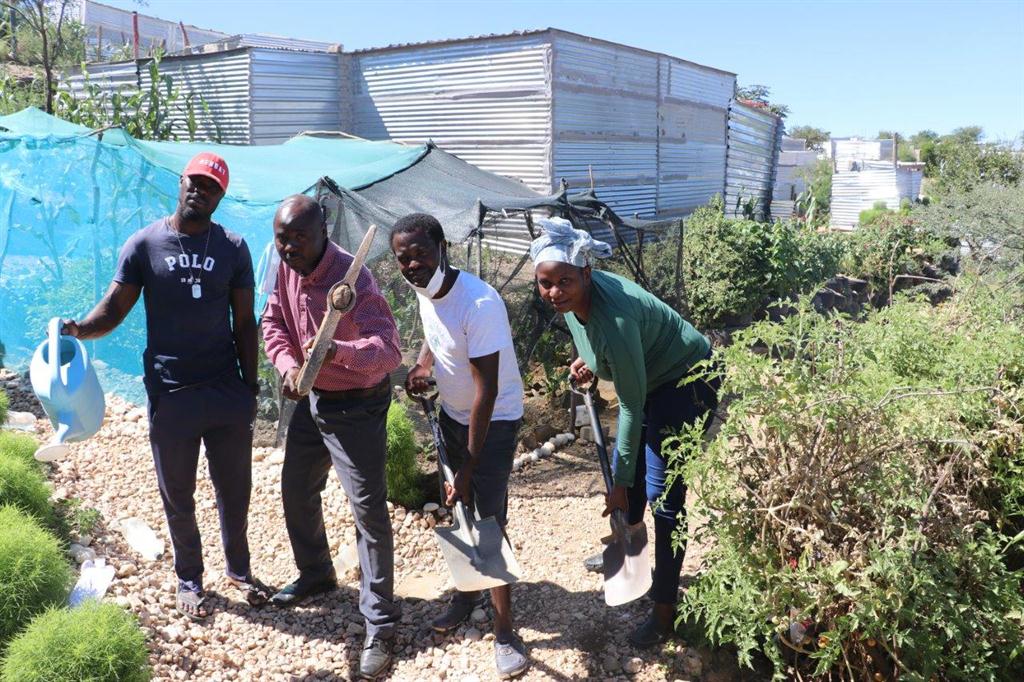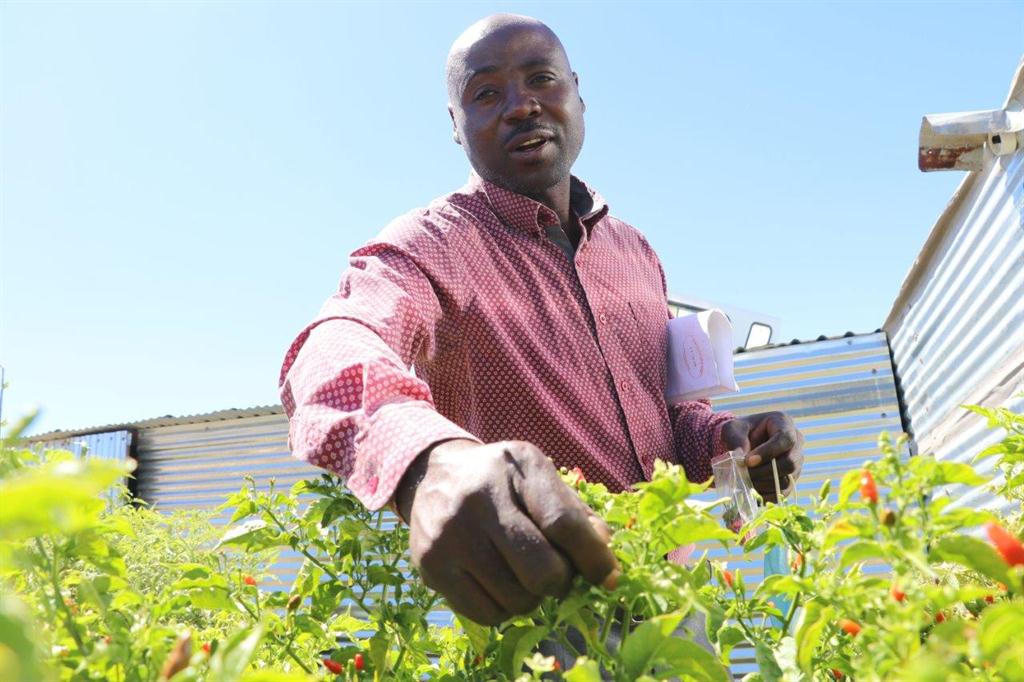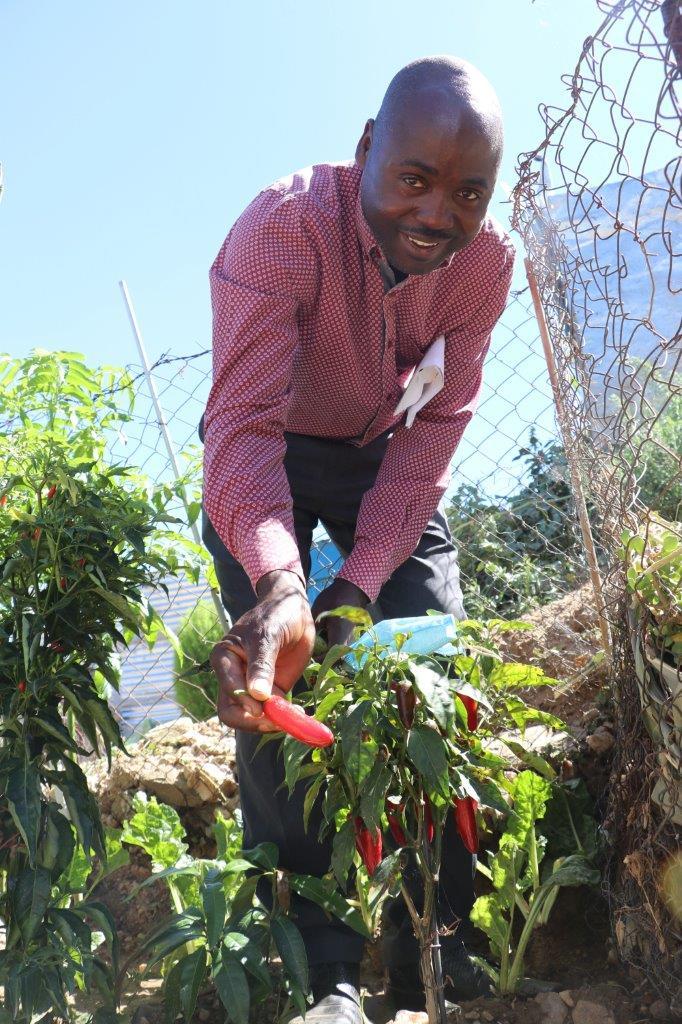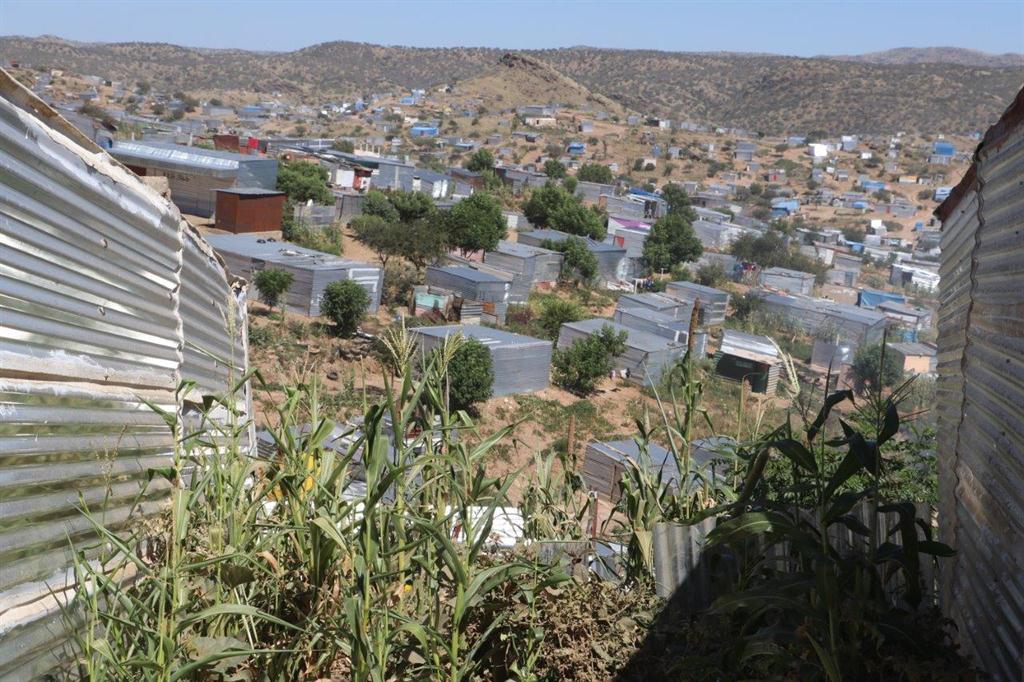Vegetables for a better life
Against all the odds, a group of gardening enthusiasts in Windhoek's Goreangab informal settlement are growing vegetables, fruit and decorative plants on the barren, rocky hillside.
TANJA BAUSE
WINDHOEK
Isaiah Shipingana (40) is a man with a passion for plants, agriculture, food security, sustainability and self-sufficiency.
In 2017 he started encouraging people around him in the Goreangab informal settlement outside Windhoek to start their own backyard gardens.
Today there are more than 15 zinc houses with their own gardens where spinach, beans, chilli peppers, green peppers, sweet potatoes, tomatoes and maize are planted. Fruit trees such as guava, orange, mango and apple are also planted.
Shipingana's love for agriculture was cultivated at school in the Erakana settlement in the far north of the country.
"In Grade 9, I had an agriculture teacher from the Caprivi Region who had so much indigenous knowledge of agriculture and sowed the love for planting in me," he says.
He has always had a garden at his house.
“I am very passionate about my garden. When I am angry, tired or stressed I go to my garden. Plants like it when you talk to them and I sit in my garden and talk to them until I feel better.”
Success story
According to Shipingana, the Goreangab Backyard Gardening Project can do very well and bring change to the country.
"Look at what the people did in Goreangab. They themselves made a garden by digging up the rocky hillside with picks and filling in the trenches with soil. The water well is located on another hill about 150 metres away, but it does not stop anyone.
“I bring 34 drums with 25 litres of water to my garden every day. I recently bought a garden hose and it makes my life a lot easier, but many of the other gardeners still carry their water daily.”
Shipingana wrote letters to several people in the government and municipality and invited them to visit the project.
Taking the initiative
"If we can rent land from the government or municipality to plant gardens, we can become self-sufficient and promote food security; we can fight poverty, malnutrition and famine.
“We can provide jobs and combat gender-based violence. When people work on the fields all day long, they are too tired to even want to fight.
“People are frustrated; there is nothing to eat, there is nothing to do, there is just nothing. Give us land to rent and we can make a difference.”
More than a month later, he still has not received any response to his letters and invitations.
"Nobody even said they had received the invitation."
Green fingers
Joseph Nghivafe (40) also boasts a garden around his corrugated iron house.
"I watched Isaiah and decided it was something I could do too. I approached him and he helped and taught me. I ate an apple and decided to sow the seeds and now I have many apple trees in my yard.
“I also have other tree seedlings like papaya, guava, orange and moringa that I sell. I am not an educated man, Grade 8 is my last school year, but I can grow food and support my family," he said.
Hendrik Gabriel (33) not only plants vegetables but also flowers and shrubs because he likes plants.
"There are many young people here who can work and plant vegetables. We ask the government for land to be able to do that. We are not looking for land from here to Tsumeb; we are just looking for a few hectares.
“We can work the country and those who do not produce or work have to go and others can come in their place.
"I sell my vegetables to the people of the area at very cheap prices at night because they do not have a lot of money around here," Gabriel said.
"If we can do it on the rocky mountain without the right tools, imagine what we can do that if we are given the chance," Shipingana said.
WINDHOEK
Isaiah Shipingana (40) is a man with a passion for plants, agriculture, food security, sustainability and self-sufficiency.
In 2017 he started encouraging people around him in the Goreangab informal settlement outside Windhoek to start their own backyard gardens.
Today there are more than 15 zinc houses with their own gardens where spinach, beans, chilli peppers, green peppers, sweet potatoes, tomatoes and maize are planted. Fruit trees such as guava, orange, mango and apple are also planted.
Shipingana's love for agriculture was cultivated at school in the Erakana settlement in the far north of the country.
"In Grade 9, I had an agriculture teacher from the Caprivi Region who had so much indigenous knowledge of agriculture and sowed the love for planting in me," he says.
He has always had a garden at his house.
“I am very passionate about my garden. When I am angry, tired or stressed I go to my garden. Plants like it when you talk to them and I sit in my garden and talk to them until I feel better.”
Success story
According to Shipingana, the Goreangab Backyard Gardening Project can do very well and bring change to the country.
"Look at what the people did in Goreangab. They themselves made a garden by digging up the rocky hillside with picks and filling in the trenches with soil. The water well is located on another hill about 150 metres away, but it does not stop anyone.
“I bring 34 drums with 25 litres of water to my garden every day. I recently bought a garden hose and it makes my life a lot easier, but many of the other gardeners still carry their water daily.”
Shipingana wrote letters to several people in the government and municipality and invited them to visit the project.
Taking the initiative
"If we can rent land from the government or municipality to plant gardens, we can become self-sufficient and promote food security; we can fight poverty, malnutrition and famine.
“We can provide jobs and combat gender-based violence. When people work on the fields all day long, they are too tired to even want to fight.
“People are frustrated; there is nothing to eat, there is nothing to do, there is just nothing. Give us land to rent and we can make a difference.”
More than a month later, he still has not received any response to his letters and invitations.
"Nobody even said they had received the invitation."
Green fingers
Joseph Nghivafe (40) also boasts a garden around his corrugated iron house.
"I watched Isaiah and decided it was something I could do too. I approached him and he helped and taught me. I ate an apple and decided to sow the seeds and now I have many apple trees in my yard.
“I also have other tree seedlings like papaya, guava, orange and moringa that I sell. I am not an educated man, Grade 8 is my last school year, but I can grow food and support my family," he said.
Hendrik Gabriel (33) not only plants vegetables but also flowers and shrubs because he likes plants.
"There are many young people here who can work and plant vegetables. We ask the government for land to be able to do that. We are not looking for land from here to Tsumeb; we are just looking for a few hectares.
“We can work the country and those who do not produce or work have to go and others can come in their place.
"I sell my vegetables to the people of the area at very cheap prices at night because they do not have a lot of money around here," Gabriel said.
"If we can do it on the rocky mountain without the right tools, imagine what we can do that if we are given the chance," Shipingana said.







Comments
Namibian Sun
No comments have been left on this article